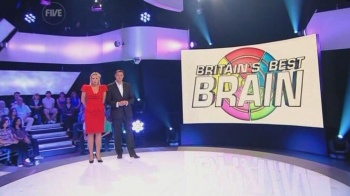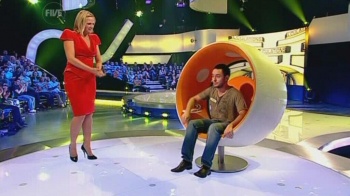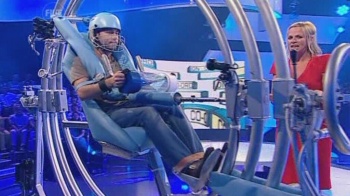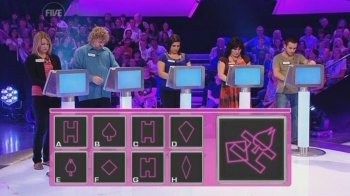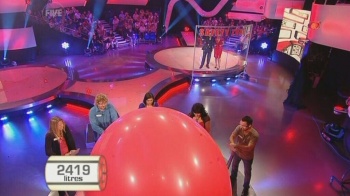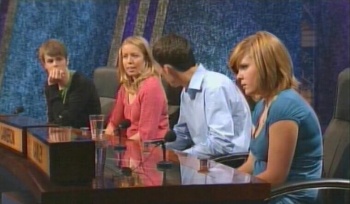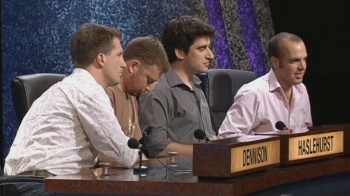Weaver's Week 2009-11-08
Last week | Weaver's Week Index | Next week
Contents |
Britain's Best Brain
Tiger Aspect / Group M for Channel 5, 8pm Wednesdays
| "This is not a quiz show," says one of the show's hosts. Well, we'll have to think about that. Not for very long: there are questions, there are answers, there are points awarded. Yes, there are physical elements, but this is a quiz show. Much as we hate to disagree with the lovely Zoe Ball, her script is wrong.
Yes, Zoe Ball is back on the magic tellybox, for the first time in far too many years. She's working with Jamie Theakston, who has fronted two of our favourite one-series wonders during the current decade: Beg, Borrow or Steal and The Search deserved far longer runs than they got. Jamie and Zoe were almost inseparable in the late 1990s, when they hosted Live and Kicking, and then went on to celebrity chat show The Priory. In this quiz, the objective is to find the person who is best at doing those mildly diverting little brain teasers on a certain hand-held computer thingummy. However, watching people playing computer games only just worked on Gamesmaster, and we can be sure that neither Dominik Diamond nor Patrick Moore wanted anything to do with this show. Instead, the players are given silly things to do, and some of them are set to music – a tinkly jingle plays at the start and end of each part. | |
| The introduction is onto a nice, bright, well-lit set. We do like this set, it has all the various hues of The Colour of Money, and the best video walls we've seen since this year's Eurovision Song Contest. Really, it's a lovely set, and with the lovely Zoe and Jamie involved, surely the programme's on to a winner.
Well, maybe not. Five contestants appear on the set, and our hosts talk to three of them. Which three? It doesn't matter, the others will have a quick chat before the opening round, which we're running into at a rate of knots. Round one is Calculation, and (according to the scientific burble that accompanies the show) is designed to test the part of brain that focusses on mathematical operations. In turn, the contestants sit in an orange chair that goes round and over their heads. Have we suddenly tuned into Zoe's previous series Class Of... Design School 1966 by mistake? No, because this chair is a bit special. It contains some speakers: out of some will come voices speaking numbers and mathematical operations, out of the others will come some "distracting" music. Do people really perform worse when they're hearing oompah bands play down their lugholes? Anyway, the contestants get ten sums, and three seconds to answer each puzzle. Correct answers earn points, and these are totalled up on the Brain Score Board at the end of the round. | |
| How do the answers become points? It isn't actually explained on the show, which we find to be something of a gratuitous over-simplification. Thirty points for an answer given in no time at all, 1 point lost for each tenth of a second before the contestant finishes giving the correct answer, and nothing for a wrong answer. Right in 2.3 seconds? Seven points!
Next comes the show's recurring challenge, the Co-ordination round. At various intervals throughout the show, each of the contestants will invited to turn a digital eggtimer so that all of the virtual "sand" runs from the top to the bottom. Simple, just put the white bit at the top and the blue bit at the bottom. The special difficulty is that the contestant has to do this while strapped to a gyroscope that's spinning and turning them all the while. A perfect performance will see the sand drain in 20 seconds, and that's worth 300 points; the points drain away to zero if the task's not complete after 90 seconds. Only one player does this before round three, the Memory round. This tests the bit of the brain that does something or other, we know they said what but we can't remember. This round falls into three segments. In part one, the contestants are shown ten pairs of pictures: someone who claims to be a famous celebrity (though we only recognise about half of these people) and a regular inanimate object. The challenge is to remember the pairs, and associate two people with their nominated object. Four questions like this, 20 points available, and 5 seconds to think. | |
| For phase two, there's an association between the objects – appearing in the same order as before – and sound effects. The contestants are challenged to identify the object from its sound. Again, four questions, this time for 25 points, and 5 seconds before they drop away to nothing. Responses are made by pressing the appropriate item on a touchscreen thingummy. In the final part, the challenge is to identify the famous person from the sound alone, backtracking through the everyday object. Four questions, 30 points, and the statutory five seconds.
Two more contestants play the gyroscope thing either side of the commercial break, and there's a trick question for viewers to ponder while fast forwarding through the adverts. Then it's into round four, recognition. This one falls into two parts. Part one asks the players to identify three shapes they see in a picture from eight possibilities. Some of the shapes are similar, but not the same. Three questions in this part, 60 points per question, and ten seconds to answer. The second part is spot-the-difference. Rather than have the two pictures appear on screen side by side, the two are shown one after each other, with a brief period of grey screen between the two, so that it's not entirely obvious. Just two of these differences, again 60 points at stake, ten seconds to retrieve some of them. | |
| Then the last two contestants play the gyroscope, and we see how their scores affect the overall board. There's also a call-and-lose competition to win some goodies provided by the sponsors, where entries can be made by telephone, premium SMS, or on the back of a postcard. How terribly recherché! Next thing we know, they'll be inviting us to submit messages by telex.
Almost inevitably, round five – Risk – comes at the end. It makes sure the show goes out with a bang, by inflating a weather balloon until it bursts. With a literal bang. Literally. Everyone in the studio is issued with ear defenders, the contenders are given goggles and earplugs to wear, and Jamie and Zoe retreat behind a thick plastic screen. The contestants must stand around the balloon, keeping their thumb on a button until they think it's fit to burst. The contenders are given guidance on how much air the balloons take on average, and how much previous balloons have taken. As in the other rounds, there are 300 points up for grabs: anyone holding their button when the balloon bursts gets nothing, the players who released score based on the ratio of when they went compared to when the balloon burst. For instance, if the balloon goes pop on 6000 litres and a contender lets go on 5000, they score 5000/6000*300 = 240 points. Simple. So simple that it's beneath the viewers. | |
| Let's nail our colours to the mast, we rather like brain games, and Britain's Best Brain has many things going for it. The challenges are properly orthogonal to each other, there's no attempt to test the same thing twice. The set design is clean and simple, the graphics are clear and bright, and Jamie and Zoe still have that magic.
However, there are little things that we think stand to be improved. It's right to place the gyroscope challenge in little bits through the show, but we don't reckon it actually makes any sort of good television: the gyrocam is just a blur, the long shots don't show the egg-timer in enough detail to see how the contestant's faring. Nor are we convinced by the final round, it's almost as if they had drawn "Zoe and Jamie", "Promote the sponsor's product", and "Have a gimmicky ending" from the format tombola. Psychologists will no doubt have something to say about the theories expounded by Britain's Best Brain. This column knows next-to-nothing about psychology, and we will not expound on topics we know so little about. We do know something about game shows, and this is a good – but not utterly outstanding – example. |
University Challenge
Second round, match 1: Girton Cambridge v St George's London
| Girton Cambridge beat Nottingham on 3 August, St George's overcame York on 28 September. In their heats, both sides missed more bonuses than they got right.
We begin with City of the Week, St Louis. Word of the Week follows in the next starter, it's "Crack", and the Girton side secures a full house on tongue-in-cheek mini biogs of English monarchs. Fact we didn't know: turquoise takes its name from Turkey, where it was originally found. Geekery of the Weekery comes in the phrase "Your bonuses are on the physics of Star Trek". The first visual round is of teachers of Defences Against the Dark Arts in the Harry Potter movies. It's all Greek to us, but not to Allanah Brown-Kerr, who has helped Girton to a 100-0 lead. St George's tip off with the next starter, remembering (inter alia) that ? is the fifth Greek letter. There's no escape from the stars of Only Connect, a show where they tend not to have runs of four questions that completely fox the panel. Thumper can get as worked up as he likes that people don't know doggerel, it won't help at all. Nor will giving quotes that are unfavourable to the humble pun. We're impressed that St George's remembers the phrase "information superhighway", which enjoyed a brief vogue of popularity in February 1994. Thumper's prejudice that no-one reads "the nonsense" of Marshall McLuhan any more is confirmed as St George's record nul point on a set of bonuses about his writing. The audio round is on animals from Carnival of the Animals, and takes Girton's lead back up to 115-50. | |
| Thumper has his generous hat on again when he allows a player to think on a question he'd specifically said had to be answered as soon as one buzzes. We do wonder what the point was of including the fact that the flag of Western Australia has a black swan on it, when there had been a long sequence about a book. St George's suffer a long set of questions about wave equations, which has us wondering where we put the Rules of Numberwang. We understand those. The generous hat remains on when Thumper accepts a long hesitation on a starter. Visual round number two is on depictions of the Madonna (as in mother of Jesus, not pop star with conical bra) with or without child, and Girton's lead has been trimmed back to 130-95.
The stars of The OC return by tracing out a capital delta (?) on the map of Europe, and it helps St George's pull within ten points. They tie the game with the next starter, a musical term, but fail to take advantage of the bonuses. Who wrote "Ecce homo"? It takes forever to dredge this out of the collective memory, but it falls to Girton's knowledge banks. We're impressed that people remember the biblical character of Ruth from her mother-in-law, Naomi; less so that St George's only seem to know one French river – it comes right in the end, and the sides are level. St George's re-take the lead with the next starter, but again fail to take advantage of the bonuses. Again, Girton take the next starter, and the first bonus puts them in the lead. Indeed, they get all three, so St George's needs two correct answers. A missignal is precisely what they don't need, they do get another starter as Mr. Tilling sounds like he's gonna blow, the gong sounds, and Girton has won, 170-160. Phew. Where did Girton go right? A decent bonus conversion rate – 16/27, no missignals, and four starters from Becca Cawley. St George's got one more starter, but their bonus conversion rate was only 11/30. Jonathan Sturgeon answered five starters correctly. The overall correctness rate: 47/85. | |
| Next match: Newnham Cambridge v St Andrews |
Mastermind
Heat 10
Susan Sworn starts us tonight. She's taking Richard III (1452-85), the last Plantagenet monarch. He was implicated in the murder of Henry VI (1471), which promoted his brother Edward to the throne, and in the murder of three young princes in the tower. Richard became King in 1483 following his brother's death. Since his defeat at Bosworth Field (1485), Richard has been the victim of a smear campaign, led by such campaigners as Billy Shakespeare of Stratford. The contender answers quickly and crisply, and it seems that she's chafing at some of the longer questions. The round is absolute perfection, and ends on 19 (NINETEEN) (0).
Follow That! Philip Smith is going to tell us about the Life and Times of Morihei Ueshiba. Ueshiba (1883-1969) created aikido, a martial art that blends with an attack, rather than repels it. His life includes much suffering, as Japan was invaded by Russia and China in his younger years. Mr. Smith's father was one of the leading exponents of aikido in the UK. Some awkward answers and Japanese words in the questions, slowing both sides down, and ending on 12 (1).
Paul Tucker has been swotting up on The Chartist Movement. Chartists supported the People's Charter of 1838, which proposed universal (male) suffrage, payment of MPs, and voting by secret ballot on 24 June each year. There were further efforts to bring these principles into effect during the 1840s, but not until 1918 would all men get the vote. The round concentrates mostly on the people behind the movement, rather than its high ideals, and after a slow start ends on 11 (0).
Mark Grant is our last contender tonight. Édouard Manet (1832-83) recorded the ephemera of life in Paris in great detail, and was close to many Impressionists, but wasn't one himself. It's another rapid-fire round, and the contenter's visible concentration lapses only once. The score: 17 (0).
Having been drawn against two such strong contenders, there's very little hope for the remaining contenders. Paul Tucker advances in his round to 18 (4), Philip Smith finishes on 21 (3).
The repechage:
- John Cooper 29 (3)
- Ian Scott Massie 26 (2)
- Les Morrell 26 (3)
- Colin Wilson 25 (0)
- William de Ath 25 (4)
- Frances Gregory 24 (2)
Mark Grant is one of the 2008 Only Connect champions, and reached the grand final of this show in 2005. The contender is deliberately looking away from the light, and concentrating hard. His final answer is on that well-known song "The rain in Spain", and takes him to 27 (2).
Susan Sworn – a heat-winner in 2007 – needs nine to win, and an entirely plausible 11 to join the 30 Point Club. Surprisingly, she passes on two of the first three questions, including a definition of the isobar. Must be the way the question was phrased. When she knows the answer, the contender answers at once, but when she doesn't, it's visible. The final score is 24 (3), which isn't quite enough to enter onto the repechage board.
Mark Grant is our winner, we'll see him again in the semi-finals next year.
This Week And Next
Our contracts department reports than Antan Dec has re-signed to ITV, ensuring they'll remain with the channel until the end of 2011. Amongst the projects they're working on is Push The Button, which might just be a replacement for the increasingly-tired Saturday Night Takeaway format.
Terry Burns will be the new chairman of Channel 4. It's not a job that brings much day-to-day commissioning power, but the position does determine how the wind blows for the channel. Burns chaired the last report on the BBC charter in 2005, and had spent time fixing The Lottery Corp after its scandals.
Ratings for the week to 25 October, when 14m people watched the result of Simon Cowell Annoys, and 12.8m the performances. It leaves Strictly Come Dancing (8.88m) and All-Star Family Fortunes (7.4m) trailing; the latter was a million up on last week, but still beaten by the gawpfest that was Question Time (8.35m). HIGNFY secured an audience of 5.4m, Masterchef The Professionals 4.25m, and University Challenge 3.5m.
Amongst digital channels, 1.9m people saw More Annoyance on Sunday on ITV2, double the audience from the previous night. Come Dine With Me attracted 775,000, Mock the Week on Dave 485,000, and America's Next Top Model 410,000. Strictly's audience is boosted by 250,000 viewers on BBC-HD, and we welcome S4C's Fferm Ffactor to the ratings, 33,000 tuned in for the competitive farming show.
We should briefly mention "I Won University Challenge", a film in the Wonderland series, which aired on BBC2 last Thursday. It struck us within about five minutes that the result was going to mock the participants, to portray them as freaks and/or geeks, completely different from normal people. It's almost as if the producers had decided on the editorial line they wanted to push, and ignored the evidence to the contrary. We're not going to get that forty minutes back, are we?
On the upside, readers can spend some of their time in far more profitable ways, such as watching Reading University's best show called Accumulate!, Accumulate!. The first episode of the new series is now available for online viewing.
Other new shows this week are Sell Me the Answer (Sky1, 3.30 weekdays), the return of Bamzooki (CBBC, 5.15 Wednesday), and Bwlletin (Radio Cymru, 6.03 Friday). There's another chance to see Starter for Ten (BBC2, 9pm Monday). Your Saturday night times: Strictly 6.50 – 8.30, Cowell 8 – 9.30.
To have Weaver's Week emailed to you on publication day, receive our exclusive TV roundup of the game shows in the week ahead, and chat to other ukgameshows.com readers, sign up to our Yahoo! Group.

